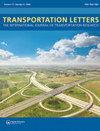管理早高峰区域间公交出行需求的高峰前票价折扣政策:首尔大都市区案例研究
IF 3.3
3区 工程技术
Q2 TRANSPORTATION
Transportation Letters-The International Journal of Transportation Research
Pub Date : 2024-10-20
DOI:10.1080/19427867.2023.2264048
引用次数: 0
摘要
高峰前票价折扣政策在城市公交服务中越来越常见,并显示出分散早高峰时段需求的潜力。本研究分析了区域间公交乘客在上午时段的发车时间选择行为。在考虑乘客偏好异质性的基础上,采用混合对数模型估算了票价折扣率、车内拥堵和其他影响因素作用下的发车时间偏移概率。分析数据是通过陈述偏好调查获得的,调查对象是经常乘坐首尔市区区间公交车的乘客。选择模型按出发时间段(高峰、前高峰和后高峰)和职业类型(固定时间工作者、灵活时间工作者和学生)进行细分。对未观察到的偏好的边际效用进行估算,以提出政策影响。实验分析结果表明,在高峰时段改变发车时间的目标乘客是灵活时间工作者和学生。本文章由计算机程序翻译,如有差异,请以英文原文为准。
Pre-peak fare discount policy for managing morning peak demand of interregional bus travel: a case study in Seoul metropolitan area
Pre-peak fare discount policies have become increasingly common in urban transit services and show potential to spread morning peak-hour demand. This study analyzes the departure time choice behavior of interregional bus passengers during morning hours. A mixed logit model is applied to estimate the probability of shifting departure time as a function of fare discount rate, in-vehicle congestion, and other influential factors, accommodating heterogeneity of passenger preferences. The analysis data are obtained through a stated preference survey, which is conducted to passengers who regularly use the interregional bus in Seoul metropolitan area. Choice models are segmented by departure time periods (peak, pre-peak, and post-peak) and occupation types (fixed time worker, flexible time worker, and student). Marginal utilities of the unobserved preferences are estimated to suggest policy implications. From the experimental analysis, target passengers for shifting departure time during peak hour are suggested as flexible time workers and students.
求助全文
通过发布文献求助,成功后即可免费获取论文全文。
去求助
来源期刊

Transportation Letters-The International Journal of Transportation Research
TRANSPORTATION SCIENCE & TECHNOLOGY-
CiteScore
6.40
自引率
14.30%
发文量
79
审稿时长
>12 weeks
期刊介绍:
Transportation Letters: The International Journal of Transportation Research is a quarterly journal that publishes high-quality peer-reviewed and mini-review papers as well as technical notes and book reviews on the state-of-the-art in transportation research.
The focus of Transportation Letters is on analytical and empirical findings, methodological papers, and theoretical and conceptual insights across all areas of research. Review resource papers that merge descriptions of the state-of-the-art with innovative and new methodological, theoretical, and conceptual insights spanning all areas of transportation research are invited and of particular interest.
 求助内容:
求助内容: 应助结果提醒方式:
应助结果提醒方式:


